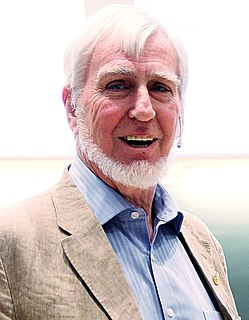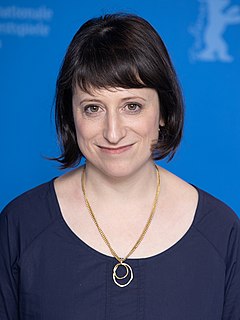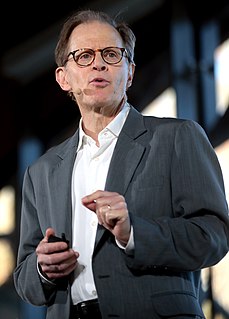A Quote by John O'Keefe
We will move from looking at correlations between brain activity and behaviour to studying how the brain causes mental states and behaviour.
Related Quotes
The task of neural science is to explain behaviour in terms of the activities of the brain. How does the brain marshall its millions of individual nerve cells to produce behaviour, and how are these cells influenced by the environment...? The last frontier of the biological sciences – their ultimate challenge – is to understand the biological basis of consciousness and the mental processes by which we perceive, act, learn, and remember.
The pace at which science has progressed has been too fast for human behaviour to adapt to it. As I said we are still apes. A part of our brain is still a paleo-brain and many of the reactions come from our fight or flight instinct. As long as this part of the brain can take over control the rational part of the brain (we will face these problems).
Mood reflects the biology of the brain. How you feel is affected by the chemicals in the brain, and these are the same chemicals that form the basis of mood-altering drugs. You may use yoga, meditation, cognitive behaviour therapy (CBT) or exercise to alter your mood, or revert to healthy eating, regular exercise and getting enough sleep.
The emergence of a unified cognitive moment relies on the coordination of scattered mosaics of functionally specialized brain regions. Here we review the mechanisms of large-scale integration that counterbalance the distributed anatomical and functional organization of brain activity to enable the emergence of coherent behaviour and cognition. Although the mechanisms involved in large-scale integration are still largely unknown, we argue that the most plausible candidate is the formation of dynamic links mediated by synchrony over multiple frequency bands.
Everyone uses the brain at every moment, but we use it unconsciously. We let it run in the background without realizing the power we have to reshape the brain. When you begin to exercise your power, the everyday brain, which we call the baseline brain, starts to move in the direction of super brain.
It is certain that there may be extraordinary mental activity with an extremely small absolute mass of nervous matter: thus the wonderfully diversified instincts, mental powers, and affections of ants are notorious, yet their cerebral ganglia are not so large as the quarter of a small pin's head. Under this point of view, the brain of an ant is one of the most marvelous atoms of matter in the world, perhaps more so than the brain of a man.
The brain of a person in love will show activity in the amygdala, which is associated with gut feelings, and in the nucleus accumbens, an area associated with rewarding stimuli that tends to be active in drug abusers. Or, to recap: the brain of a person in love doesn't look like the brain of someone overcome by deep emotion. It looks like the brain of a person who's been snorting coke.
My father is a cultural anthropologist and my mother ran an outpatient clinic and treated a lot of people who had been institutionalised. I was very fascinated with behaviour and criminology and why people do things that don't make any sense. I would probe my mother: "Why? Why would somebody do this?" And look for some causality between someone's mental state and their behaviour. I think it had a lot of influence on me.
We now know that the way to help a child develop optimally is to help create connections in her brain—her whole brain—that develop skills that lead to better relationships, better mental health, and more meaningful lives. You could call it brain sculpting, or brain nourishing, or brain building. Whatever phrase you prefer, the point is crucial, and thrilling: as a result of the words we use and the actions we take, children’s brains will actually change, and be built, as they undergo new experiences.
We separate problems with the brain into neurological and psychiatric, and it's because it's stigmatised still. Mental illness is still stigmatised. Imagine if we treated people with cancer like that. Just because your personality changes and your behaviour changes, all of a sudden you are put in a different category.
The dialectical critique of positivist habits of mind ... is interested only in behaviour which is 'important' to the actor; that is, behaviour which is emotionally charged to the degree that it is either frequently recalled, reflected upon, or day-dreamed about. ... That science which is less discriminating in the behaviour it chooses to investigate gains clarity and distinctiveness at the cost of confining itself to the trivial.




































